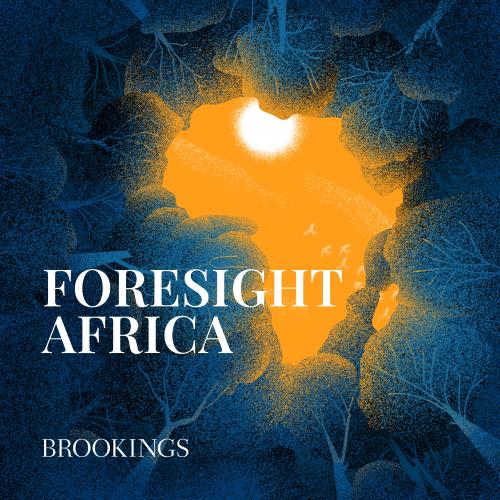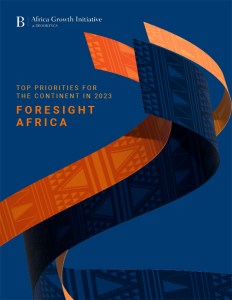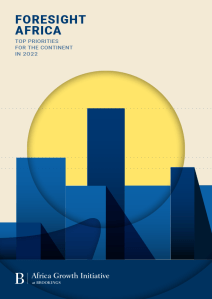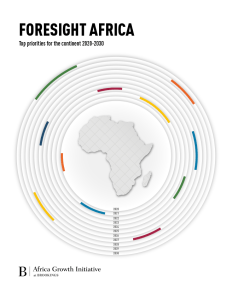2024
With this and every edition of Foresight Africa, we aim to capture the top priorities for the region in the coming year, offering recommendations for enhanced economic and political resilience. In doing so, we hope that Foresight Africa 2024 will promote dialogue on the pressing issues facing our continent. We also hope that such ideas will contribute to sound policies and strategies for better development outcomes.
In this edition, you will find essays and viewpoints from Africans in positions of trust and responsibility in multilateral and regional organizations, policymakers, finance ministers, central bank governors, private sector leaders, heads of foundations and civil society organizations, youths, and scholars from think tanks and academia, among others.
Development financing

In Chapter 1, our authors share policy options to address the economic challenges facing the continent. Now more than ever, it is vital for policymakers to pay attention to mobilizing domestic resources, to strengthening financial systems, and to ensuring that development funds—whether borrowed or raised through taxes—are used strictly for the purposes intended. These measures are critical especially as policymakers will face future, expensive, and likely devastating shocks due to the climate crisis.
Ch. 1 Viewpoints
In Chapter 1 viewpoints, our authors explore policy options to address economic challenges facing the continent.
Adedoyin Salami
April 2, 2024
Louis Kasekende
May 21, 2024
Raymond Gilpin, Daouda Sembene, Daniel Cash, Jacob Assa, Aloysius Uche Ordu
May 29, 2024
Kamau Thugge
July 3, 2024
Climate change

Africa is severely impacted by extreme weather events and yet, Africa receives the least amount of global financing to address this difficult collective action problem. With 2023—the hottest year on record—dominated by multiple global convenings (the Nairobi Summit, UNGA and COP28), our authors tackle the existential climate change crisis in Chapter 2, highlighting the inequities and the urgent need for increased financial commitments to address the climate crisis.
Ch. 2 viewpoints
In Chapter 2 viewpoints, our authors tackle the existential climate change crisis.
Ede Ijjasz-Vasquez, Jamal Saghir, Morgan Richmond
February 22, 2024
Angela R. Pashayan
February 29, 2024
Abraão Vicente
March 22, 2024
Kerllen Costa
March 28, 2024
Tedros Adhanom-Ghebreyesus
May 9, 2024
Yemi Osinbajo
June 26, 2024
Paul Muthaura, Oliver Glanvile
July 26, 2024
Entrepreneurship and structural transformation

Policymakers are grappling with how to generate more jobs for Africa’s burgeoning youth demographic in an increasingly competitive global environment. From sustainability-focused startups to MSMEs and family-owned businesses, African entrepreneurs have taken on the myriad challenges facing the continent to build a more sustainable and economically prosperous future. Thus, Chapter 3 is dedicated to the entrepreneurs and small businesses that are responsible for most job creation on the continent. Our authors focus on the inclusive and supportive policies needed to foster these ventures and to sustain the high-growth potential of African entrepreneurship.
Ch. 3 viewpoints
In Chapter 3, our authors focus on policies to support Africa’s entrepreneurs and small businesses.
Kasirim Nwuke
February 6, 2024
Seyi Kumapayi
March 8, 2024
Sabrina Dorman
March 26, 2024
Adenike Adeyemi
June 13, 2024
Zouera Youssoufou, Zakari Momodu
June 27, 2024
Trade and regional integration

Although entrepreneurs have been instrumental to economic growth, it is noteworthy that far greater opportunities abound through the African Continental Free Trade Area Agreement (AfCFTA). Thus, in Chapter 4, our authors explore the status of economic integration and trade, and the policy actions which member states, entrepreneurs, and other stakeholders can take to accelerate the implementation of this landmark agreement. Also explored here are the prospects for U.S.-Africa trade and investment relations in view of AGOA’s imminent expiration in 2025.
Ch. 4 viewpoints
In Chapter 4, our authors examine trends in regional economic integration and trade.
Witney Schneidman
February 15, 2024
Hippolyte Fofack
February 23, 2024
Alan Hirsch
July 17, 2024
Stephen Karingi, Jason McCormack
July 30, 2024
Digital economy

A key tool for addressing the numerous challenges facing Africa is technology, which has accelerated the digitization of services, commerce, education, and other aspects of life on the continent. Indeed, many countries have developed national digital economy policies to foster innovation and entrepreneurship for job creation and poverty reduction. Thus, in Chapter 5, our authors examine policy options to unlock the digital economy potential necessary for competitiveness and inclusive growth.
Ch. 5 Viewpoints
In Chapter 5, our authors consider policy options to unlock the potential of the digital economy.
Chinasa T. Okolo
March 15, 2024
Paula Ingabire
May 2, 2024
Mark Schoeman
May 16, 2024
Kingsley Obiora
July 19, 2024
Gender

Fostering an inclusive ecosystem means creating the opportunities and the infrastructure to support all workers and entrepreneurs. In this vein, we dedicate Chapter 6 to the women and girls across the continent who, despite setbacks, continue to create and transform the landscape.
Ch. 6 viewpoints
In Chapter 6, our authors explore the ways Africa’s women and girls are increasing opportunity for all.
Belinda Archibong
February 13, 2024
Leora Klapper
March 7, 2024
Maxime Houinato
June 6, 2024
Sope Williams
July 23, 2024
Governance

Distrust of the government gained some traction in 2023 as evident in the coups across West and Central Africa. We close this year’s edition of Foresight Africa in Chapter 7, on governance, by focusing on those trends and how African leaders can regain the trust of their citizens.
Ch. 7 viewpoints
In Chapter 7, our authors delve into ways African leaders can regain the trust of their citizens.
Danielle Resnick
February 8, 2024
J. Peter Pham
March 19, 2024
John Mukum Mbaku
June 20, 2024
Joseph Siegle
July 25, 2024
Watch video from the launch event







